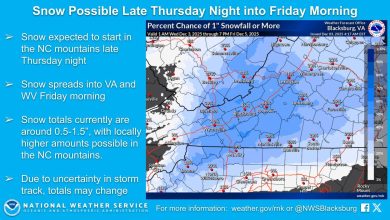Last Updated on March 4, 2012 11:41 am
After one of the most active and deadly years in recent weather history, Gov. Bev
Perdue declared March 4-10 Severe Weather Awareness Week in North Carolina and recommends that families have safety plans for home, work or school so they can respond quickly when tornados or severe storms threaten.
“Already this year, we have seen tornadoes sweep through several of our western counties,”
Perdue said. “That type of weather is almost unheard of for January in North Carolina. And we
all saw in 2011 just how quickly these storms can strike and how dangerous they can become.
That is why it is so critical to have emergency plans in place.”
Perdue urged North Carolinians to take time now to discuss and rehearse family emergency plans
so that when the National Weather Service issues a storm warning in their area, everyone can act
quickly and take shelter calmly. Schools and government buildings statewide will hold tornado
drills Wednesday, March 7, at 9:30 a.m. to rehearse their emergency plans.
In 2011, the National Weather Service issued more than 200 tornado warnings for North
Carolina and recorded 63 tornadoes, more than twice the state average. Twenty-six people were
killed and hundreds injured. Combined, the tornadoes caused approximately $400 million in
damages. In addition, the NWS issued more than 1,200 severe thunderstorm warnings, and
recorded more than 1,500 incidents of severe thunderstorms with damaging winds and/or large
hail.
March, May and November are the deadliest months for tornadoes in the state. However,
residents should be equally prepared for other forms of severe weather, too, such as lightning,
floods or hail.On April 16, 2011, 30 confirmed tornadoes raged across one third of North Carolina; the greatest one-day total in state history. Twenty four people died and hundreds were injured as a result of
the storms that day. But that was not the only outbreak. Earlier that month, twisters damaged
homes in Davidson and Surry counties. In May, severe weather struck Rutherford County and in
August, tornadoes hit Wilson County. Tornadoes struck Davidson County again in November,
along with Rowan.
Tornadoes usually form during heavy thunderstorms when warm, moist air collides with cold
air. These storms can also produce large hail and strong winds. Damaging winds are equally as
dangerous.
When severe weather is likely, people should listen to local radio, television, a weather channel
or a National Oceanic and Atmospheric Administration radio for information. If a tornado watch
is issued, the conditions are favorable and a tornado is possible. However, if a warning is issued,
a tornado has actually been spotted or appeared on radar. This is the time when people should go
to a safe shelter immediately.
North Carolina Emergency Management recommends the safest place during a tornado is
underground in a basement. If there is no basement, people who are at home should go to the
lowest floor of the house and to an interior room such as a hallway, pantry or closet. School
children should go to inner hallways, but stay out of gymnasiums, auditoriums or cafeterias
where there is a large roof span. Office workers should take shelter under something sturdy like
a desk or a table to protect from flying debris or a collapsed roof. Everyone should stay away
from windows.
Mobile home residents are especially vulnerable to damage from high winds and should go to a
prearranged shelter when severe weather is predicted.
Every family’s emergency plan should include information on what to do if severe weather
happens while traveling to work or school. Drivers who see a tornado forming or approaching
should leave the car immediately and take shelter in a low-lying area. A tornado can easily blow
a car off a road and many people have been killed while trying to outrun a tornado. Those who
are on foot or a bicycle could encounter falling trees, downed power lines or lightning, and they
should go to a safe place immediately. The basement of a sturdy building is best. Lying flat in a
ditch or low area may also offer protection, but beware of possible flash flooding and flying
debris.
Preparation for any type of severe weather also means having a family disaster plan and an
emergency supply kit assembled and in a location that is easy to access during an emergency.
More information on tornadoes and overall emergency preparedness is available at
www.ReadyNC.org and www.ncem.org



















